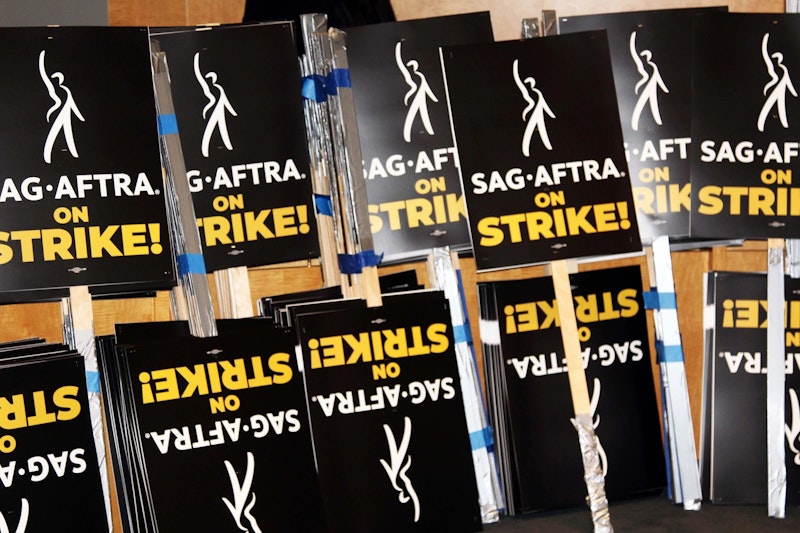Late in the spring when the WGA first went on strike, I echoed Paul Schrader’s remarks about the impending DGA and SAG-AFTRA contract renewals possibly cascading into a storm of labor negotiations forcing the hands of studio executives. It didn’t quite go like this—DGA struck a cheap deal while the actors joined the wave that’s poised to put the largest number of people on strike in the United States in more than half a century, as the workers at American Airlines and Teamsters at UPS have also authorized strike actions. It got white-hot after SAG president Fran Drescher gave her fiery speech saying they were about to “break down the gates of Versailles” (it was such a strong show of leadership that insiders almost forgot about her deeply contentious election against Matthew Modine for the top seat at the union two years prior). What makes all of this so shocking is how detached union rhetoric seems from the broader American political world, as if it exists in a parallel society to our own. And while the actions have led to a projection by onlookers to the strikers’ overall politics, I don’t necessarily think it’s as informative to the personal beliefs of those involved, at least not in the way the conversation is structured in the US. Instead, I think it’s more informative of how institutions themselves dictate the way politics are formed.
Many have pointed out the oddity of the last SAG strike of this magnitude led by the man who struck the death-blow to the 20th-century union movement by firing more than 11,000 striking air traffic controllers: Ronald Reagan. While Reagan’s political career is often remembered for his soft-spoken neo-fascist fervor, the man himself was little more than a sounding board for people around him. A bad actor with a passion for the limelight, he’d happily do and say whatever those who’d get him in front of the most cameras wanted him too. While acting as president of a massive labor union, this means making statements sounding to the left, and while being a Republican governor in the 1960s and 70s or President of the United States in the 1980s, he’s parroting stances firmly and in every way on the right. Yet while in complete political opposition to each other, the president of SAG or the US have a similar appeal to the power-hungry individual. It’s the nakedly perverse part of big politics and the sad consequence about building an institution for the workers, where something by the workers, for the workers, becomes governed by a higher professional class. At the same time, the union’s relationship to the employer is never wholly symbiotic, and its logical conclusion is never merely maintaining itself but changing the power structure entirely.
What’s most concerning to employers about unions is not what concessions they’ll have to give workers, but the fundamental shift in how power works. The potential to refuse one’s labor changes everything about the conversation between the employer and employee, and really a union, as we conventionally understand them, is a way to make this conversation permanent. And for about 100 years, it seemed like this gradual shift in power was rippling through every facet of the American workforce, to the point that it was so inevitable that it had to be violently fought against by the owners. But while in the historiography it might be easy to categorize it as a struggle between left and right, you don’t find West Virginian coal miners or Earl Browder talking about dialectical materialism as much as you do patriotism.
The American labor movement has never been defined by intellectual militants as so many proletarian revolutions have (and talking about that in relation to the potential success or failure of a “capital R” Revolution is another matter), but an implicit understanding of power. This is where anarchists tend to be more equipped at analysis than Marxists, where instead of classifying systems through categorization, a dialectic there reifies the other side as much as it seeks to combat it, anarchist theory is more interested in actions and effects, breaking the order down itself. It’s Deleuze and Guattari’s deterritorialization—a union doesn’t merely insert themselves into the conversation, but breaks it down and build a new relationship, a new system.
This is why I think traditional classifications, conversations held between people in people in lecture halls and meeting rooms, the distinction between left and right, doesn’t help to understand what’s happening. Unionized workforces exist in an entirely different paradigm of thought than all the rest. As much as it can get cable news coverage, the real meat of the strikes aren’t televised, because they can’t be. 24-hour news cycles and industry publications can talk and talk and talk all they want about what they see is happening, but they can’t truly understand it through their prisms of left-or-right-wing talking-headed punditry. The union movement doesn’t play by traditional politics, it plays its own game.

